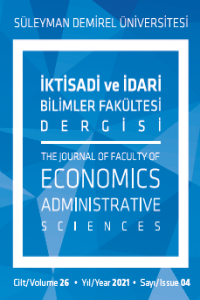Öz
Bilgi ve iletişim teknolojisindeki ilerlemeler hem mikro hem de makro bazda ülke ekonomilerine katkı yapmaktadır. Bu sebeple bilgi ve iletişim teknolojisindeki gelişmeler, toplumun sosyal ve ekonomik gelişimine yönelik etkin politikalar tasarlanmasına imkân verecektir. Bu amaçla, çalışmada, 1994-2019 dönem verileri kullanılmış olup bağımlı değişken işgücüne katılım oranı bağımsız değişkenler ise mobil hücresel telefon abonelikleri ve internet kullanan bireylerin toplam nüfusa oranı olarak ele alınmıştır. Değişkenler, doğrusal regresyon modeli ile analiz edilmiştir. Analiz sonucuna göre, mobil hücresel telefon aboneliklerinde gerçekleşen 1 birimlik artış işgücüne katılım oranı üzerinde -0.1209 azalışa neden olmaktadır. İnternet kullanan bireylerin toplam nüfusa oranında gerçekleşen 1 birimlik artış işgücüne katılım oranı üzerinde 0.1761 artışa neden olmaktadır.
Anahtar Kelimeler
Kaynakça
- ABRI, G. A. ve MAHMOUDZADEH, M. (2015). “Impact Of Information Technology on Productivity and Efficiency in Iranian Manufacturing Industries’’, J Ind Eng Int, 11, 143–157, DOI 10.1007/s40092-014-0095-1.
- AKENDE, E. Ahmed, M. Loffredo, M. ve Curcio, S. (2017). “The Role of ICT in Labor), Productivity’’, Universita` degli studi di Torino, 1-45, DOI: 10.13140/RG.2.2.33262.46406, https://www.researchgate.net/publication/329248125
- AYDIN, E. (2018). “Türkiye’de Teknolojik İlerleme İle İstihdam Yapısındaki Değişme Projeksiyonu: Endüstri 4.0 Bağlamında Ampirik Analiz’’, Yönetim Bilimleri Dergisi, 16(31): 461-471.
- BADRAN, F.M. (2019), “Technologıcal Change And Its Impact On The Labor Market In Egypt’’, 1-21, https://www.researchgate.net/publication/335057275
- BASU, S. ve FERNALD, J. G. (2006). “Information and Communications Technology as a General Purpose Technology: Evidence from U.S. Industry Data”, Federal Reserve Bank of San Francisco Working Paper Series, Working Paper 2006-29: 1-25.
- BLANCHFLOWER, D. ve BURGESS S. (1995). “New Technology and Jobs: Comparative Evidence from a Two Country Study’’, ,Firm Performance and Employment at the National Academy of Sciences, Washington DC, May 1995, 1-38.
- CECCOBELLIA, M. GITTOA, S. ve MANCUSOA, P. (2012). “ICT Capital and Labour Productivity Growth: A Non-Parametric Analysis of 14 OECD Countries’’, MPRA Paper No. 68642, 1-27.
- DACHS, B. (2018). “The impact of new technologies on the labour market and the social economy’’, STOA - Science and Technology Options Assessment, 1-64. http://www.europarl.europa.eu/stoa/.
- GOAIED, M. ve SASSI, S. (2017). “The Effect of Ictadoption on Labour Demand: A Cross-Region Comparison’’, Papers in Regional Science, 98(1): 1-15.
- GÜDER, G. ve TAŞÇI, K. (2006). “Avrupa Birliği ve Türkiye’de Bilgi ve İletişim Teknolojileri İstihdam İlişkisi’’, 5. Uluslararası Bilgi, Ekonomi ve Yönetim Kongresi, 3-5 Kasım 2006, Kocaeli-Türkiye, 1-19.
- HAWASH, R. ve LANG, G. (2010). “The Impact of Information Technology on Productivity in Developing Countries’’, Faculty of Management Technology, Working Paper Series NO:19, 1-23.
- LOVRIC, L. ( 2012). “Information-Communication Technology Impact on Labor Productivity Growth of EU Developing Countries’’, Original scientific paper UDC 330.44:330.34, Zb. rad. Ekon. fak. Rijvol. 30 (2): 223-245.
- MERIKÜLL, F. (2008). “The Impact of Innovation on Employment: Firm- and Industry-level Evidence from Estonia’’, Working Paper Series 1/2008, Eesti Pank Bank of Estonia, 1-29.
- MIKE, F. ve LALEH, M.M. (2016). “Bilgi ve İletişim Teknolojilerinin İstihdam Üzerine Etkisi: Seçili Ülkeler Üzerine Bir Uygulama’’, Atatürk Üniversitesi Sosyal Bilimler Enstitüsü Dergisi, 20(2): 601-614.
- MOSHIRI, S. ve JAHANGARD, E. (2007). “ICT Impact on the Labor Productivity in the Iranian Manufacturing Industries; A Multilevel Analysis’’, Iranian Economic Review, 12(18): 121-142.
- MURILLO, G. M. (2016). “The İmpact of ICT’s on Employment in Latin America: A Call for Comprehensive Regulation’’, IBEI Working Papers, 2016/48, 1-28.
- NKAMA, G. H. A. (2015). “An Analysis of the Impact of ICT Investment on Productivity in Developing Countries: Evidence from Cameroon’’, Council for the Development of Social Science Research in Africa, Africa Development, XXXIX(4), 117–132, (ISSN 0850-3907).
- OULTON, N. ve SRINIVASAN, S. (2005). “Productivity Growth and the Role of ICT in the United Kingdom: An Industry View, 1970-2000”, CEP Discussion Paper No 681.
- PIATKOWSKI, M. (2003). “The Contribution of ICT Investment to Economic Growth and Labor Productivity in Poland 1995-2000’’, TIGER Working Paper Series, No: 43, 1-23.
- ŠNIUKIENĖA, A. M. ve SARKANE, E.G. (2013). “Impact of Information and Telecommunication Technologies Development on Labour Productivity’’, Procedia - Social and Behavioral Sciences ,110(2014):1271–1282.
- TIMMER, M.P. ve VAN ARK, B. (2005). “Does Information and Communication Technology Drive EU-US Productivity Growth Differentials?”, Oxford Economic Papers, 57(4): 693-716.
- TOADER E., FIRTESCU, N.B. ROMAN, A. and ANTON, S.G. (2018). “Impact of Information and Communication Technology Infrastructure on Economic Growth: An Empirical Assessment for the EU Countries’’, Sustainability, 10(3750), 1-22, doi:10.3390/su10103750.
- VIJSELAAR, F. ve ALBERS, R. (2004). “New Technologies and Productivity Growth in the Euro Area”, Empirical Economics, 29(3): 621-646.
- ZIMMERMANN, K.F. (1991). “The Employment Consequences of Technological Advance, Demand and Labor Costs in 16 German Industries’’, empec, 16: 53-266.
Ayrıntılar
| Birincil Dil | Türkçe |
|---|---|
| Bölüm | Makaleler |
| Yazarlar | |
| Yayımlanma Tarihi | 31 Ekim 2021 |
| Yayımlandığı Sayı | Yıl 2021 Cilt: 26 Sayı: 4 |


